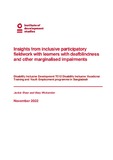| dc.contributor.author | Shaw, Jackie | |
| dc.contributor.author | Wickenden, Mary | |
| dc.coverage.spatial | Bangladesh | en |
| dc.date.accessioned | 2023-03-16T13:02:17Z | |
| dc.date.available | 2023-03-16T13:02:17Z | |
| dc.date.issued | 2022-11 | |
| dc.identifier.citation | Shaw, J. and Wickenden, M. (2022) Insights from Inclusive Participatory Fieldwork with Learners with Deafblindness and Other Marginalised Impairments, Brighton: Institute of Development Studies, DOI: 10.19088/IDS.2023.014 | en |
| dc.identifier.uri | https://opendocs.ids.ac.uk/opendocs/handle/20.500.12413/17903 | |
| dc.description | Informed by the UN Convention on the Rights of Persons with Disabilities (UN 2006), Task Order 12 (TO12) in the DID programme acknowledges disabled people’s right to work and is based on the STAR youth employment programme run by BRAC in Bangladesh. Learners are given technical training and placed with a ‘Master Crafts Person’ to learn their chosen trade over six months. The specific intervention we explored was part of TO12 and set out to include people with more complex and or marginalised types of impairments in an adapted version of the STAR process. This involved learners being more specifically supported over six months and given additional support and training (by a technical trainer). The adapted TO12 intervention has been broadly successful so far and the suggestions made by the learners will be useful to inform INGO implementers in further inclusive employment related projects, particularly for people who have had limited opportunities for education or training previously and are seen as ‘difficult to include’. | en |
| dc.description.abstract | This paper describes and discusses a piece of inclusive and participatory fieldwork carried out at two sites in Bangladesh in close collaboration with local and international NGOs working on disability as part of the UK government (FCDO) funded Disability Inclusive Development (DID) programme. Our research fieldwork engaged two small groups of learners with specific identities (deafblind or young women) in workshops aiming to gather examples of and understand their experiences as young people with disabilities, both in general terms and about a work-focussed programme. Creative, visual and arts based multi-modal methods were used to encourage maximum participation, including from those with little or no spoken language or literacy. Some were accompanied by carers or supporters who also shared their perspectives. Local staff teams from collaborating INGOs and Organisations of People with Disabilities (OPDs) supported, participated in and learnt from the process. Detail about the workshop activities and data from the participants are presented and discussed. Recommendations from the participants and reflections on the methodological aspects are provided. We concluded that using inclusive, participatory and creative research methods generates rich insights into people’s experiences, which can increase understandings about marginalised people’s lives and inform future interventions to promote their inclusion. | en |
| dc.language.iso | en | en |
| dc.publisher | Institute of Development Studies | en |
| dc.rights.uri | http://creativecommons.org/licenses/by/4.0/ | en |
| dc.subject | Children and Youth | en |
| dc.subject | Participation | en |
| dc.title | Insights from Inclusive Participatory Fieldwork with Learners with Deafblindness and Other Marginalised Impairments | en |
| dc.type | Other | en |
| dc.rights.holder | Institute of Development Studies 2023 | en |
| dc.identifier.team | Participation Power and Social Change | en |
| dc.identifier.doi | 10.19088/IDS.2023.014 | |
| rioxxterms.funder | Department for International Development, UK Government | en |
| rioxxterms.identifier.project | Disability Inclusive Development | en |
| rioxxterms.version | VoR | en |
| rioxxterms.versionofrecord | 10.19088/IDS.2023.014 | en |
| rioxxterms.funder.project | 22595b7c-2f5b-4cd3-9923-5a1a66b80fa5 | en |


